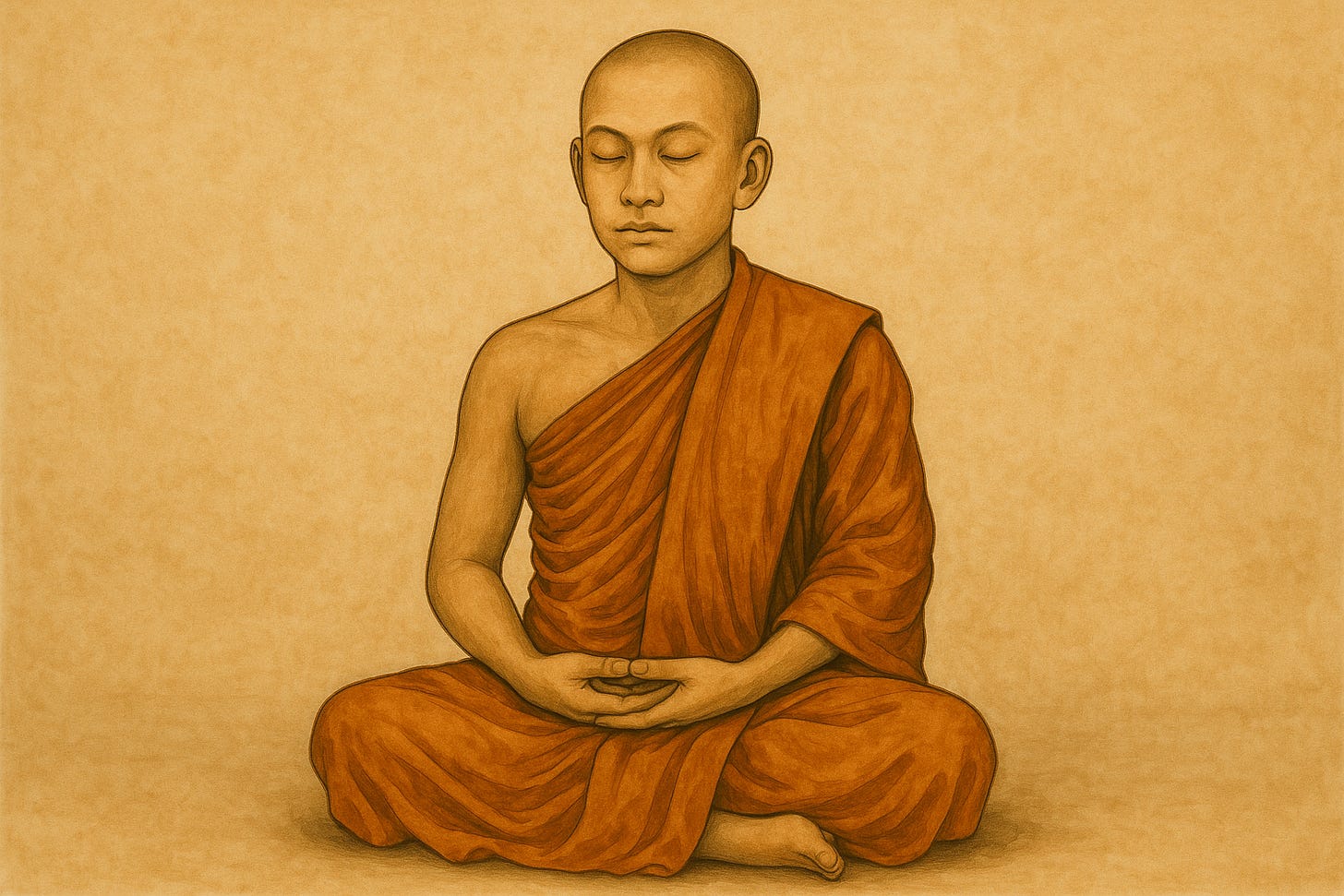How meditation helps you think
By teaching you what you really are
The other night I was talking to a friend who expressed the idea that the purpose of meditation is relaxation, and it occurred to me that this is a fairly common misconception. It’s fine if you prefer to meditate in order to relax. It can be an extremely relaxing practice. A mind bath, I like to call it, like watching Instagram videos of engineering machinery operating with smooth movements in a kind of industrial ASMR.
But no, the deeper purpose of meditative practice is learning to listen to yourself think. Because the more you listen, the more you begin to realize that the voice inside your head, the one that you identify as being your voice, as the sound of you thinking your own thoughts, is not actually you in the sense that you think it is. And you realize this because if you sit down and stop thinking, the thoughts keep coming without you. The thinking voice you hear inside your head is not more you than the beating sound you hear inside your chest. Yes, your heartbeat is yours. Yes, your brainbeat, though far more complex a signature, is also yours. But it is not you.
On the meaning of faith
Often even the faithful define faith as belief without evidence. But being faithful to a friend does not mean blindly believing in their existence. It means being true to that friend. The word “faith” comes from the Latin fides, or loyal. And we have many reminders of this fact in our languag…
In early Buddhist texts such as the Pali Canon, this thinking voice is known in Sanskrit as kapicitta, literally the monkey mind. This is because, like a monkey, it doesn’t shut up, but instead moves from one thought to the next, letting go of one only to seize another, like a monkey swinging on so many branches. The uncontrolled nature of the untrained mind is restless and reactionary. In Chinese, this is captured by the phrase 心猿意馬 xīn yuán yì mǎ, or “heart of a monkey, mind of a horse,” which I like because there is something nervous about the monkey mind that reminds me of the horses I used to tend to as a stable boy. Namely, a skittishness. In Tibetan, Buddhists speak of the mind as a drunken monkey or a mad monkey.
Various Buddhist masters have commented on this subject, from the Vietnamese Zen monk Thích Nhất Hạnh, who wrote extensively on the wandering nature of thought in The Miracle of Mindfulness, to the Tibetan Buddhist teacher Chögyam Trungpa, who wrote in Cutting Through Spiritual Materialism about how the monkey mind tricks us into ego identification. In the end, mindfulness is really nothing more than learning to tame the monkey mind simply by observing it. In doing so, you not only realize that you are not your monkey mind, but that the monkey, as the unsettled voice in your head, is the source of all your opinions and views and ideas, prompting a question. What are you once the sum of all your thoughts is subtracted from your consciousness?
In Buddhist terms, the silent, loving being that is left when you remove all thoughts is known as anattā, or no-self. The self once personality is removed. This is a powerful realization, because almost everyone in the world goes around thinking that the voice they hear in their head is their own self, thinking those thoughts. When in reality, your stream of consciousness is more like a literal stream that you’ve been watching your entire life. And you know it so well that, if a leaf were to come floating down that stream, you would be able to predict precisely how it would curl and twist and go around a rock or spin in an eddy. You would know it so well that you would be able to predict what was happening to the point that you could convince yourself you were in control of the stream. But that would be an illusion.
On Conversion
This letter is a response to Benjamin Carlson, the author of the newsletter The Carlson Letter, the former executive editor of The Atlantic and former China correspondent for AFP. His work has also appeared in The New Republic, Esquire, and Rolling Stone, and he was my colleague at GlobalPost. I contacted Ben with the id…
And if you meditate, and you learn to listen to the monkey voice, without trying to suppress it or engage with it, but simply letting your thoughts bubble up and pass by, like so many leaves floating past on a river, then you will eventually notice that you’re not the one causing these thoughts to bubble up. And once you realize this, you can start to get away from what the psychologist Daniel Kahneman calls, in his book Thinking, Fast and Slow, System 1 thinking. This kind of thinking is emotional, reactive, instinctive, and dumb. It’s not even thinking really, but rather reacting without thinking. On the other hand, you have System 2 thinking, which is slow, methodical, and logical. This is the only kind of “thinking” that qualifies as such, not as passively hearing a voice inside your head, or passively expressing those thoughts, but as actively processing information.
In most debates I have, I invariably notice the other person is System 1 “thinking,” and sometimes I even notice myself doing it. Thankfully, it’s easy to spot. In fact, it’s right there in the brilliant title of Kahneman’s book. Unthinking reactions are fast. Thinking is slow. When you tell someone you voted for Trump, let’s say, and they fire off a remark in less than a second, you know they didn’t actually think about what you said because nobody thinks that fast. This is one of the most powerful things you get from meditation — learning to listen, acknowledge that distinction, and more frequently keep yourself in System 2, actively thinking, or as I prefer to put it, thinking.
Don’t get me wrong, your monkey mind can be a useful advisor, along with your intuition, your emotions, and so on. But if you want to think clearly, and express yourself clearly to others, you must stand in the doorway between these advisors and your mouth. Anything less is mindless reacting. But once you learn to notice that single fact of mental life, you can begin to train your mind, and what you gain in having a trained mind is the ability to pause, to respond with awareness, but most of all, it is quite simply the ability to think.






Would I be incorrect to distinguish between emotion and passion (in the generic sense)? My definition of passion is an extreme and powerful emotion - often resulting in a reflexive response. I view emotion as an umbrella term for non-rational feelings that would normally influence or color responses to people or situations I encounter, while passions are more extreme feelings (positive or negative) that can trigger an anti-rational response, that is, a response with little to no thought behind it, substantially or entirely driven by the strong emotions alone. Or am I making a distinction without a difference - only a matter of degree?
Is my tendancy to immediately consider various sides of an argument, looking for flaws or weaknesses in the argument (even with my own thoughts) a monkey brain reaction or just the rational thought process kicking in quickly? I've always considered it a personality quirk - a natural argumentativeness.
I have found that the mental detachment you describe in watching your thoughts can be done similarly with regard to physical pain (viewing it as if it were happening to someone else and not me) can help control the pain, or at least my response to it.
Again you have given me much to think about and I thank you. Wishing you and yours the best.